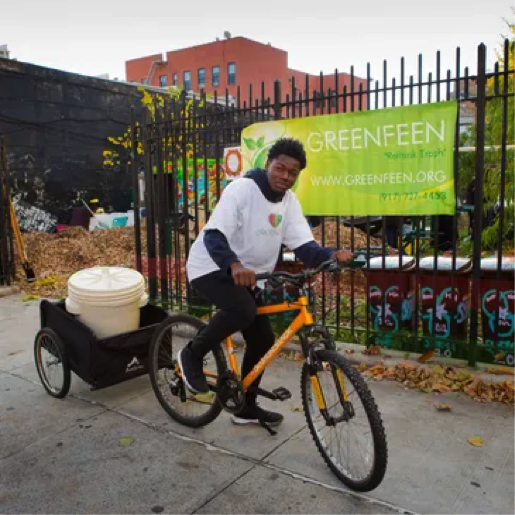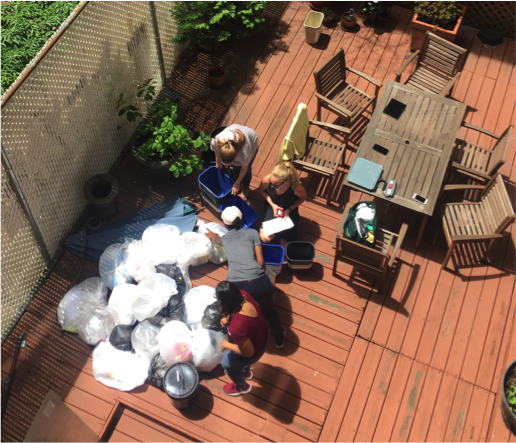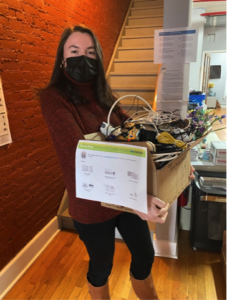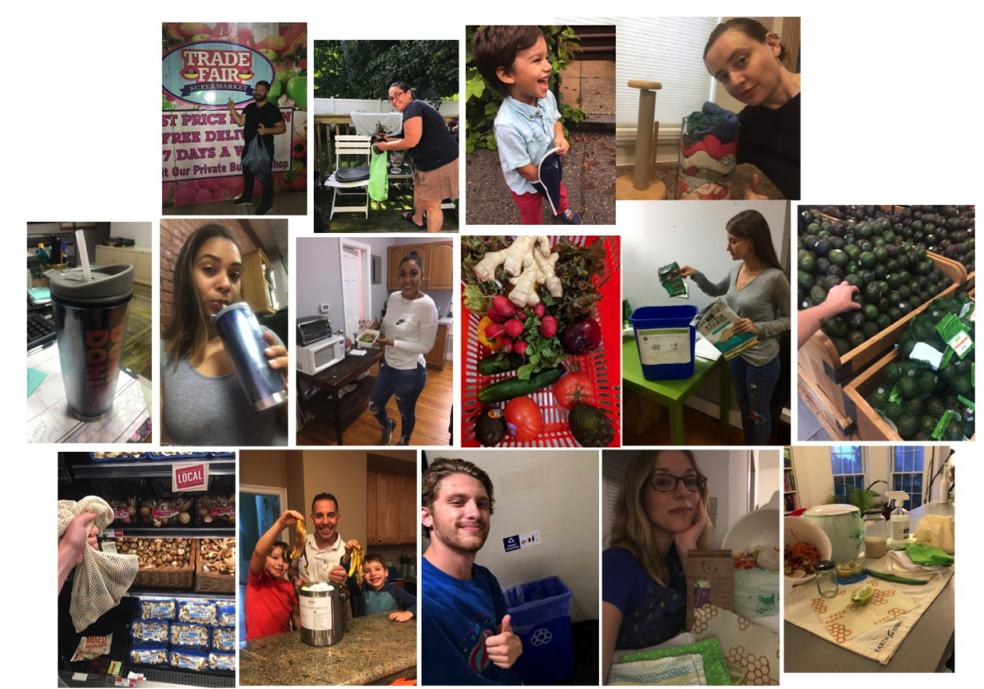
TRUE CERTIFIED ZERO WASTE CASE STUDY
Project: Great Forest, Inc.
Certification Level: Gold
Diversion Rate: 91.3%
Type of Facility: 5-story Brownstone
Facility operations: Office floors
In March 2021, Great Forest became TRUE certified to the Gold level for Zero Waste, with a diversion rate of 91.3%. This was verified by the GBCI (Green Business Certification Inc.), which administers the TRUE (Total Resource Use and Efficiency) process.
Over 30 years in business, Great Forest has followed a tried and tested system of sustainable waste management best practices that we have put into practice not only for our clients, but for our own business operations as well. By certifying our office headquarters in New York, we hope our experience can be an example to others to pursue Zero Waste. As noted by the GCBI in their 2020 review:
Great Forest is walking the talk and recently registered their own headquarters located in Harlem, NY with TRUE to gain additional insight and experience to bring to their clientele. — GBCI
How did Great Forest become TRUE certified? Below are highlights of what we did, and what your business can do too, to achieve Zero Waste.
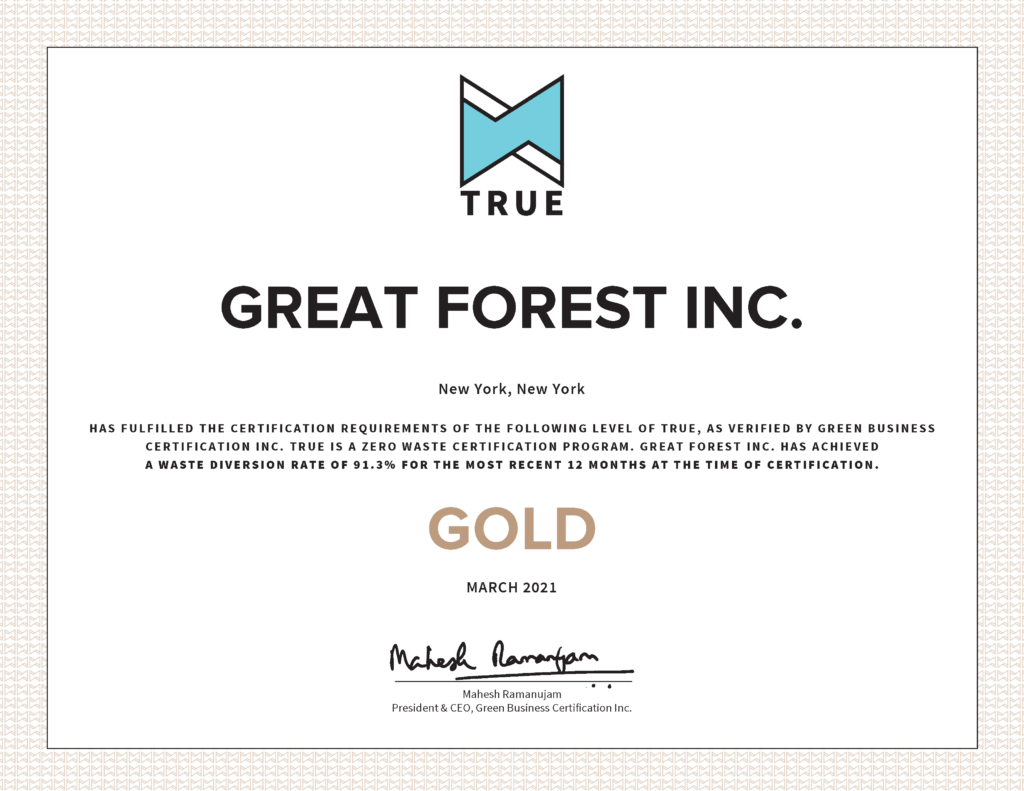
TRUE Certified Case Study: Key Takeaways
The TRUE certified process provided a number of overarching takeaways, with the top two being the importance of outreach to staff and other stakeholders, and the formalization of Zero Waste policies.
The first step we took to get TRUE certified was to create a Zero Waste Team. This team took on the task of understanding what programs we already had in place, and what more could be done. By having a dedicated Zero Waste team, not just a single person like a Zero Waste project lead, we were able to get significantly more buy-in from staff and support to troubleshoot problems as they arose. We saw an increase in engagement from staff across departments, not just our Zero Waste-certified employees. We also received an influx of ideas for new waste reduction programs that have been implemented at our HQ. We continue to experience broad support for our commitment to maintaining a diversion rate above 90% going forward, and being TRUE certified.
Formalizing policies that had been informal also reaped benefits. Our Zero Waste policies were tested as staff began to return to the office after the COVID-19 citywide shutdown in 2020. Formalization helped to ensure our Zero Waste programs were maintained, and will continue to be improved upon, even with disruptions.
Here are the credits we achieved in every category on our TRUE certified journey: Redesign, Reduce, Reuse, Compost (Re-earth), Recycle, Zero Waste Reporting, Diversion, Zero Waste Purchasing, Leadership, Training, Zero Waste Analysis, Upstream Management, Hazardous Waste Prevention, Closed Loop, and Innovation.
The following is a snapshot of our TRUE certified successes and lessons learned:
Redesign
Great Forest had used a combination of formal and informal programs to ensure all waste materials met the highest and best use following the Zero Waste hierarchy. Going through the TRUE certification process encouraged us to formalize existing programs. For example, we established dedicated storage areas for cardboard boxes and other packaging, and for envelope upcycling, and communicated these programs to staff.
Reduce
While our office has always made every attempt to reduce paper use, we decided to make at least one office function totally paperless. In our case, we made the move to eliminate paperwork related to insurance. Moving to paperless required communicating with vendors to request electronic copies only, as well as redesigning our backup filing system. This not only reduced paper consumption, but also increased efficiency for our customer service team by reducing time spent filing and searching for documents.
Reuse
Great Forest has essentially eliminated single-use grocery/retail bags as well as paper towels within the waste stream due to our reuse systems. We implemented a ‘Leave a bag, take a bag’ system next to the front door for employees to use.
Another reuse program provides washable rags and napkins for staff and janitorial use. While paper towels were previously eliminated entirely, the janitorial team complained about the quality of the rags and a couple of paper towel rolls did find their way back to the office. With fewer people in the office in 2020 and irregular in-office schedules, course correction was slow, but we are now providing better quality rags and napkins that will stand repeated use.
Compost (Re-Earth)
Material from Great Forest’s organics program is brought to the Bronx where it is turned into compost for use in a community garden, which doubles as an educational public space for youth and families. Using a local vendor is a wonderful, symbiotic solution for our food waste.
Recycle
Confirming the end markets is important for understanding the environmental impacts of a recycling program. For our ongoing paper, cardboard, glass, metal, and rigid plastics recycling, and organics, we found that the end destination was local, due to the many local resources in New York City for recycling. For electronic and universal waste streams we found materials were either processed locally or sent to other facilities within the U.S.
Zero Waste Reporting
We pulled together waste bills under one umbrella that had previously been lumped under general office expenses. By pulling out waste, we are now able to focus on these expenses and see what opportunities exist for negotiating fees with vendors. This also opens the conversation up about which waste streams are most costly and why. When showing pictures of waste doesn’t move people to action, showing them the cost often does.
Diversion
When we help our clients determine their diversion rates, we set up and manage data tracking systems in many forms, ranging from high tech to pen and paper solutions. We used a mix of data gathering from invoices as well as internal tracking systems.
Having established tracking methods using bag logs for the various waste streams, we did not anticipate any interruptions in data collection. However, when there were personnel changes and COVID-19 shut down the city, there were challenges in maintaining the portion of data collection that relied on the bag count logs. With fewer people in the office, there was less waste and our regular building maintenance crew, who were familiar with the logs, were not in the building as often. As a result there was inconsistent record keeping, such as when staff would bring the trash out without the building crew’s knowledge. By the fall, reporting was back on track. With our historical records of bag counts and records when staff were in the office, we were able to estimate the missing data.
Zero Waste Purchasing
Great Forest has guidelines for identifying environmentally preferred products that address Zero Waste products, packaging, and services that are highlighted on vendor websites. Our Purchasing Manager is able to select products directly from a pre-set list of environmentally preferred products. Before we formally rolled out these purchasing guidelines, some preferable purchase information got lost in the disruption caused by the onset of COVID-19 and staff changes in 2020. For example, when we ran low on janitorial paper products in mid-2020, with only a few people in the office, a staff member made a bulk purchase without realizing there was a product preference. Takeaway: All Zero Waste purchasing guidance must be formalized and updated regularly.
Leadership
Zero waste recommendations have been formally collected through Great Forest’s Zero Waste suggestion box over the last few years. With Climate Week NYC in September each year, Great Forest had designated September as Zero Waste Month in the office. We promoted waste reduction ideas through a contest via the suggestion box. Employees were encouraged to submit new ideas to further reduce our office waste and each employee was allowed unlimited entries. The winner was chosen at the end of Zero Waste Month and received a solar backpack in addition to the suggestion being implemented.
Training
We were able to utilize Great Forest’s vast training and educational resources that we use for clients in our own office headquarters. Creating a regular schedule of Zero Waste activities has proved to be a great opportunity to not only discuss the office waste diversion programs, but also introduce and discuss Zero Waste as a concept for all staff to adopt and incorporate into their own day-to-day work regardless of their position in the company.
We formalized training by assigning a Zero Waste Training Manager, who develops quarterly Zero Waste communications and leads the staff meetings. Zero Waste topics are presented to all during staff meetings followed by distribution of written materials, slide decks, or memos, as applicable, via email. All distributed materials are available to all employees on the organization’s shared drive.
Like the trainings we provide to clients, we have also included a “what-goes-where” sorting game, where the trainer chooses those harder-to-recycle materials or notably confusing material types, and engages with staff about which bin each material belongs in and the rationale behind it. Seeing the physical item is a useful teaching tool, and we have received great engagement from staff during such training sessions. As we have transitioned to remote work, we have moved trainings online, where we are able to engage staff located in other parts of the country in addition to the regular office staff.
Zero Waste Analysis
Waste stream audits are a Great Forest speciality. We do this for hundreds of clients around the world each year, and are accustomed to seeing particular patterns of data, so we looked for them in audit results from our own office.
We found a high proportion of the trash stream was composed of organics. This encouraged us to take better note of program compliance by floor. By getting a data-driven, updated understanding of our waste profile, we are able to focus staff education based on those results. We were also quickly able to implement a centralized collection bin for unused condiment packets, sauces, plastic utensils, and napkins after observing these unused items in the trash stream.
Upstream Management
Like many other small businesses, we have less leverage when it comes to big office supply purchases, but we make an impact when we can. For example, we look for vendors that use 100% recyclable packaging and choose vendors based on that principal when we can.
Hazardous Waste Prevention
At Great Forest, employees are welcome to bring any spent batteries, bulbs, outlived or broken chargers/other cords, etc. into the office anytime throughout the year. The items are collected and stored until we bring them for processing. Our 2020 electronic and universal waste drive saw high participation rates and reminded employees about this program.
Closed Loop
It was not a challenge for Great Forest to incorporate recycled content products into our purchasing practices since our staff has prioritized purchasing recycled products from the beginning. The challenge as a small business has been consistency.
When there were personnel changes and interruptions to business operations (eg: COVID-19), the initiative to purchase recycled content products was not fully complied with, resulting in some products not meeting our standard. By establishing an Environmental Purchasing Policy, in collaboration with the regular purchasing manager, we were able to course correct and ensure the program is maintained going forward.
Innovation
The Great Forest Zero Waste team held a Zero Waste photo contest challenging staff to engage the public in Zero Waste activities via social media. The initiative got a lot of participation, thanks in part to the competition aspect with a prize for the photo with the most engagement. Photos showing Zero Waste efforts, both at home and at the office, were posted to the Great Forest Facebook page to share the actions we were taking to go Zero Waste as part of our daily lifestyles, while encouraging clients and others to do the same!
Become a TRUE certified business. The TRUE Zero Waste certification is a program for businesses to assess performance in reducing waste and maximizing resource efficiency. Learn more at true.gbci.org or talk to a Great Forest TRUE certified advisor.

